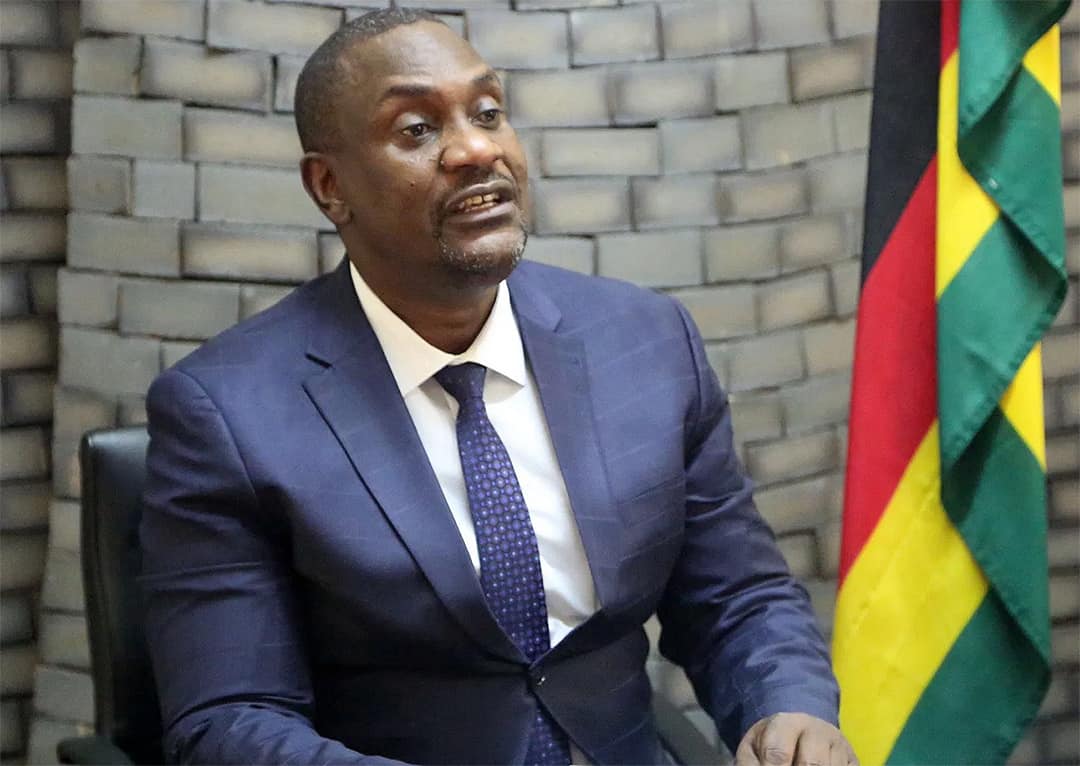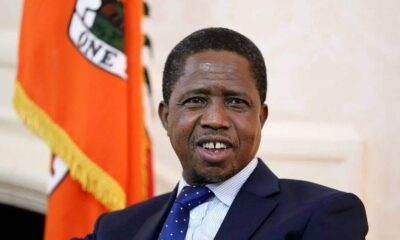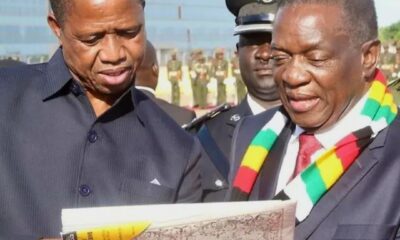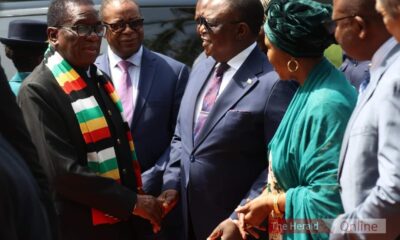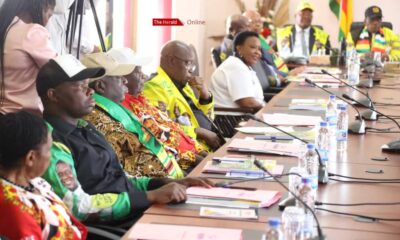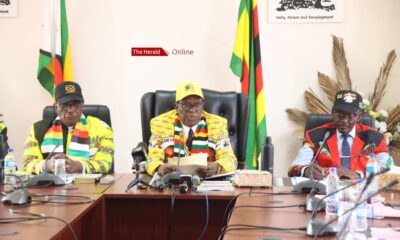OWEN GAGARE
ZANU PF’S plan to keep President Emmerson Mnangagwa in power up to 2030 is taking shape amid revelations that there is a plot to amend the law to decouple the harmonised elections and ensure parliamentary elections take place in 2028, with presidential elections being held in 2030.
Alternatively, Zanu PF wants to postpone polls to 2030 and beyond.
Zanu PF is now mobilising the captured opposition to postpone polls to 2030 under the guise of initiating reforms.
Self-imposed CCC secretary-general Sengezo Tshabangu, who was last week appointed leader of the opposition in Parliament, is expected to mobilise his forces in support of Mnangagwa’s plan.
A faction of the CCC loyal to Nelson Chamisa, who quit the party on the grounds that it was infiltrated, has distanced itself from remarks attributed to the opposition that it was supporting calls for poll postponement, and insisted the faction led by Welshman Ncube and Tshabangu were behind the plot.
Zanu PF sources say Mnangagwa initially wanted to run for a third term but abandoned his plan after strong internal resistance as well as resistance from the army.
Vice-President Constantino Chiwenga and his military-backed Zanu PF faction are solidly against the plan.
“Mnangagwa’s third term project was blocked by the army. Now he has a new plan,” a senior Zanu PF official told The NewsHawks recently.
“He no longer wants to have a third term because that route is complicated as it involves amending the constitution and a two-thirds parliamentary majority, plus a referendum, which doesn’t benefit the incumbent, a disincentive to do that.
“Now the new plan under consideration is to 2028 to 4 August 2028. amend the constitution and electoral law to de-harmonise elections, with the effect of holding parliamentary polls in 2028; presidential election in 2030. That’s different from a third term and it’s less complex.” In terms of the constitution, extending a presidential term limit would require amending section 91, which disqualifies a person “for election as President or appointment as Vice-President if he or she has already held office as President for two terms, whether continuous or not, and for the purpose of this subsection three or more years’ service is deemed to be a full term.”
However, section 328(7) bars an incumbent from benefitting from such a constitutional change.
It says: “Notwithstanding any other provision of this section, an amendment to a term-limit provision the effect of which is to extend the length of time that a person may hold or occupy any public office, does not apply in relation to any person who held or occupied that office, or an equivalent office, at any time before the amendment.”
This means such a change can only benefit future presidents. Besides, section 328(7) can only be amended through a referendum as set out under section 328(9) of the constitution.
Section 158 of the constitution of Zimbabwe says a general election (harmonised election) must be held so that polling takes place not more than 30 days before the expiry of the five-year period of Parliament which runs from the date on which the president-elect is sworn in and assumes office.
For instance, Mnangagwa was sworn in on 26 August 2018. The 30-day period before the expiry of the presidential term ran from 27 July to 26 August 2023, which was why elections were held on 23 and 24 August 2023.
After that, Mnangagwa was sworn in on 4 September 2023. The next elections are due from 5 July 2028 to 4 August 2028.
Section 143 of the constitution deals with three circumstances how Parliament is dissolved:
By two thirds of the National Assembly and Senate sitting and voting separately (self-propelled dissolution); by the President’s intervention if it refuses to pass an Appropriation Bill without good reason or by operation of the law, when its term automatically expires.
Zanu PF insiders say the de-harmonisation of elections process offers Mnangagwa a better chance to extend his rule without going through elections compared to a third term.
That is more appealing to him than the third term political nightmare, sources say. Mnangagwa said recently he does not want a third term.
Previously, he told ZTN Prime before last year’s elections: “I am going for my second term . . . this is my last term.”
That was before his recent public climbdown under military pressure.
Chiwenga is anxiously waiting to take over from Mnangagwa who is now serving his second term after reneging on their 2017 coup deal to run only one term and go.
Mnangagwa should have served from 2018 to 2023, leaving Chiwenga to come in if elected in a popular presidential poll.
However, soon after the coup internal contradictions emerged and the whole plan began to unravel.
Mnangagwa, who initially wanted an inclusive arrangement after the coup, which is why he sent an emissary to the late political bigwig Dumiso Dabengwa to join his government, tried to leave Chiwenga out of the state power structure or the presidency by appointing Kembo Mohadi and Oppah Muchinguri-Kashiri as his two deputies.
Muchinguri-Kashiri was informed of her appointment privately and she was in the process of arranging a celebration party when Chiwenga blocked it and grabbed the position for himself.
At the same time, Chiwenga seized some critical ministries from Mohadi.
After the coup, on 30 November 2017, Mohadi was appointed minister of Defence, Security and War Veterans by Mnangagwa.
He was named vice-president of Zanu PF on 23 December 2017 before being sworn in as co-Vice-President of Zimbabwe on 28 December 2017.
However, after that Mnangagwa was forced to make sudden changes. Mohadi was removed and put in charge of the National Peace and Reconciliation portfolio, while Chiwenga took over Defence and War Veterans, powerful security portfolios.
The assignments were with immediate effect.
Then acting Chief Secretary to the President and Cabinet Justin Mupamhanga announced:
“In terms of Section 99 of the Constitution, the President of the Republic of Zimbabwe may assign functions to Vice-Presidents to assist him or her in the discharge of his or her functions and perform any other functions, including the administration of any Ministry or Department or Act of Parliament.
“Accordingly, His Excellency the President, Cde E.D. Mnangagwa, has duly assigned Honourable Vice-President General (Rtd) Dr Constantino Guveya Dominic Nyikadzino Chiwenga to administer the Ministry of Defence and War Veterans Affairs. Honourable Vice-President Kembo Campbell Dugishi Mohadi will administer the National Peace and Reconciliation portfolio.”
The following year — 2018, after the elections sanitising the coup — Chiwenga and his allies were shocked at the Zanu PF annual conference at Esigodini to learn and witness a political spectacle: “Mnangagwa for 2023”.
Now it is “Mnangagwa for 2030”.
Chiwenga and his army allies have moved to stymie it.
But Mnangagwa and his faction are not giving up.
With the third term blocked, they have a new plan to amend the constitution to de-harmonise the general elections and the presidential poll, which serves their agenda.
If their plot succeeds, parliamentary elections will held as due in 2028, but presidential polls — which previously fell two years after the others — can follow in 2030.
This will be a reverse of the 2005 plan. Sometime in April 2005, Mugabe started to think about how he could extend his rule from 2008 to 2010 outside an election.
He wanted to avoid the 2008 presidential election by moving it to 2010 when parliamentary polls were due under the name of harmonisation.
Senior Zanu PF officials opposed to the move leaked the story to a Zimbabwe Independent journalist at the time, now with The NewsHawks.
The first story exposing that plan was published in April 2005 soon after the 31 March parliamentary elections that had confirmed full control of Zanu PF by decimating the main opposition MDC which had pulled a shocker in June 2000 by losing with only five elected seats.
The popular vote was also very close.
The 2005 post-election situation looked deceptively familiar.
In fact, as Robert Mugabe’s era appeared to be coming to an end amid growing economic problems and surging inflation, the MDC also faced existential challenges.
Mugabe and Zanu PF had used more sophisticated methods than previously to manipulate the electoral process through a range of legal and extra-legal means to ensure the result was basically decided well before the first voters reached polling stations.
With the addition of 30 appointed legislature representatives that Mugabe had the right to appoint, Zanu PF held 108 of the 150 parliamentary seats, comfortably above the two-thirds majority required to amend the constitution.
Zanu PF was expected to use that power to prepare a safe-landing and honourable retirement for its then 81-year-old leader who did not want to stand for re-election in 2008, but wanted to stay on for two more years.
Mugabe feared defeat by MDC leader Morgan Tsvangirai in 2008 amid a tumultuous economic meltdown and unprecedented hyperinflation after escaping reversal by the skin of his teeth in 2002.
And as it later transpired, Mugabe lost the first round of polling in March 2008 (some say he lost the election outright), forcing a run-off in June that year.
But Tsvangirai pulled out, citing violence and intimidation.
Then South African president Thabo Mbeki who had been engaging Mugabe on reforms seized the opportunity to force a government national unity.
Mbeki sent South African generals to investigate political violence. He had earlier managed to get the ruling party and opposition envoys to draft another constitution following the 2000 process that fell through.
A new constitution was only secured in 2013. Mugabe’s plans to extend his rule by two years in 2008 came under scrutiny internally after the media exposed the plot with Zanu PF at the time beset with fierce factionalism, spurred by ambitions of powerful figures to position themselves for the succession battle.
A taste of political blood-letting was provided by a bitter party congress in December 2004 which propelled Joice Mujuru to become Vice-President at the expense of Mnangagwa, but the fact that the main factions substantially represented still as yet unreconciled ethnic and regional interests suggested holding the party together would be difficult.
It took Mnangagwa 10 years to reverse Mujuru’s seemingly inexorable rise in 2014 with the help of Mugabe who had changed plans on his succession.
From 2008 onwards after rescuing Mugabe from the jaws of defeat, the army had gained control of Zanu PF internal political processes more than ever before since the Mgagao days in Tanzania in 1975.
That marked the genesis of the 2017 coup. It also took retired ex-army commander Solomon Mujuru’s death in a mysterious fire in August 2011 to have a major shift in the internal Zanu PF power structure to influenced Mugabe’s succession.
A year later, after the story of Mugabe secretly trying to extend his rule by two more years broke out — April 2006 — the then president appointed two ministers to amend the constitution to move the presidential election from 2008 to 2010 to secure an extension of his hold on power.
The journalist given the leak had the amendments. Mugabe gave Justice minister Patrick Chinamasa, his point man on constitutional issues, and his Rural Housing counterpart Mnangagwa, who was also Zanu PF’s legal affairs secretary, a fresh mandate to change the constitution to delay the 2008 presidential poll until 2010 when parliamentary elections were due to allow him to hang onto office for a further two years.
So this is what Mnangagwa — using that background and expertise — is trying to do now. He is trying to buy himself two more years in power until 2030 without an election. That is what his supporters mean when they say “2030 ED anenge achipo”.
A source explained to The NewsHawks: “This plan was linked to Zimbabwe Defence Forces commander General Phillip Valerio Sibanda’s surprise appointment to the Zanu PF politburo by Mnangagwa in December last year.
“When Mnangagwa’s appointment of Sibanda was blocked on grounds of it being unconstitutional, the President suffered another setback. He wanted to use Sibanda to checkmate Chiwenga from the army and politburo power bases.”
Mnangagwa would probably recall why Mugabe failed in his plans to avoid the same pitfalls, the sources indicate.
In 2008, Mugabe did not get an extension as the parliamentary polls due in 2010 were brought forward by two years.
Mugabe eventually failed to get two years through the backdoor because of internal dynamics, mainly the explosive December 2006 Zanu PF Goromonzi annual conference and the extraordinary congress in December 2007 to choose a candidate for the 2008 presidential poll.
Politburo minutes on those issues were leaked to the journalist in question at the time, consistently. Zanu PF internal strife almost led to a split in the party like the 2004 congress.
In 2004, it was Mnangagwa trying to break away, but in 2007 it was Mujuru who tried but balked, ensuring a stillbirth of Mavambo/Kusile/ Dawn under Simba Makoni in 2008.
Under pressure, Mugabe agreed to fight the 2008 election and it was disastrous for him: He lost the first round of polling before recovering through violence. Some say he lost the election outright, but rigged the run-off, which is likely, as results took six weeks to be announced as they managed the transition.
“Mnangagwa wants to stay on until 2030 through the path which he knows better. He is looking for ways to ensure he gets an extra two years in power the same way Mugabe assigned him to do in 2006,” a Zanu PF official said.
“De-harmonisation of elections is an option and can achieve that.”
Despite Mnangagwa’s spirited denials that he wants a third term when his current second tenure ends in 2028, his political loyalists have not dropped their open campaign for him to remain in power beyond the present constitutional limit. Mnangagwa’s bid to extend his rule to 2030 through a third term or by other means is still alive and kicking, mainly in Masvingo and Midlands provinces, his power bases.
While Mnangagwa said he did not have any plans for a third term, his political allies and supporters still continue to campaign for him to stay beyond his current constitutional tenure which ends in 2028.
The mantra is that Mnangagwa will still be there in 2030. He has not stopped them or denied that.
If anything, he is encouraging them behind the scenes to continue with their lobby.
Chiwenga and the military’s post-election political strategy blocked Mnangagwa’s third term ambitions, but not an extension.
This forced him to come out clean to say he will not seek to manipulate the constitution for a third term to hang onto power as demanded by his supporters.
Mnangagwa sidelined the army during last year’s general elections and used the state security service, Central Intelligence Organisation (CIO)-run Forever Associates Zimbabwe (Faz), to win the polls, fearing internal sabotage.
However, military commanders always said behind the scenes after the elections Mnangagwa and Faz would be stopped in their tracks, which seems to be the case.
Now his CIO-driven project has come unstuck, grinding to a screeching halt as the army backs Chiwenga to take over.
Chiwenga recently influenced key military appointments, including that of his closest ally Lieutenant-General Anselem Sanyatwe as Zimbabwe National Army commander and John Jacob Nzvede as Air Marshal. Sanyatwe and Nzvede were part of Chiwenga’s bridegroom party at his wedding last December.
Prior to that, Mnangagwa had in 2019 removed Sanyatwe and posted him to Tanzania as ambassador amid purges of the military in the aftermath of the 2017 coup which first brought him to power.
Although Chiwenga showed his clear intention to become the next Zimbabwean president during his high-profile wedding to Miniyothabo Baloyi more than at any other time before, Mnangagwa did not give up his push for a third term and now extension by proxy.
At the wedding, Mnangagwa all but endorsed Chiwenga to succeed him, but it is an open secret he does not actually want that. Mnangagwa has been giving mixed signals about it.
Until recently, Mnangagwa tried to use Zanu PF youths to push for a third term, saying he will still be there in 2030 — the same approach they used in 2018 for him to seek re-election in 2023.
Their campaign for a third term was open and Mnangagwa did not distance himself from it until it became clear that it would be politically ill-fated to do so.
Having tested the waters and found them dangerously deep, Mnangagwa is now beating a hasty retreat while posturing as a stickler for the constitution and rule of law.
Yet his re-election was riddled with unconstitutional issues and illegalities.
With Chiwenga on the political ascendancy, backed by the army, Mnangagwa says he does not harbour intentions of running for a third term.
He says there is “no iota of evidence” where the ruling Zanu PF has pushed for something that violates the constitution. Mnangagwa says Zimbabwe is a constitutional democracy that abides by the dictates of the law.
His plan is now an extension through a constitutional amendment which does not require a referendum.
